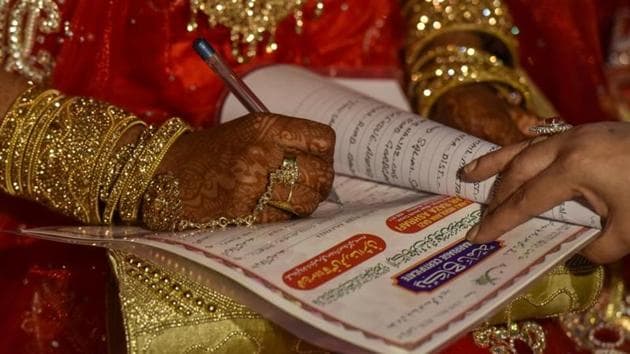In a significant judgment on January 19, the Delhi High Court ruled that individuals converting their religion for marriage with a person from a different faith must submit an affidavit declaring awareness of the consequences and implications of the new religion, particularly concerning divorce, custody, succession, and religious rights.
The case, titled Maksood Ahmad v State of NCT of Delhi & Anr, prompted the court to provide detailed guidelines for authorities overseeing interfaith marriages after conversion, as well as for recording statements of sexual assault victims under Section 164 of the Criminal Procedure Code (CrPC).
Guidelines for interfaith marriages
According to the court’s decision, a certificate detailing the explanation of the tenets, rituals, and expectations of religious conversion, along with the implications related to marital matters, must be appended to the conversion certificate. This certificate should also be presented in an additional vernacular language understood by the prospective convert to ensure comprehension, added the court.
The court emphasised the necessity of the certificate being in Hindi, if applicable, and in the language spoken and understood by the prospective convert. Additionally, the court mandated an affidavit providing information on age, marital history, marital status, and a declaration that the conversion is voluntary and undertaken with a complete understanding of its implications.
Justice Swarana Kanta Sharma clarified that these directions would not apply to individuals reverting to their original religion, as they are already familiar with their original faith. Furthermore, the guidelines do not extend to marriages conducted under the Special Marriage Act of 1954.
Here are the guidelines:
- The High Court emphasised the importance of informed consent and comprehensive understanding in the religious conversion process for marriage.
- It highlighted the need to provide individuals undergoing conversion with exhaustive information about religious doctrines, customs, and practices associated with the chosen faith.
- The Court stressed that the information should include an explanation of the tenets, rituals, and societal expectations inherent in religious conversion to ensure that consent is fully informed.
- The Court recommended that such information be provided in Hindi, or any other language preferred by the individual undergoing conversion if it is different from Hindi.
- An affidavit regarding age, marital history, marital status, and evidence of the same should be furnished, stating that the conversion is voluntary and undertaken after understanding the implications related to marital divorce, succession, custody, and religious rights.
The court justified these guidelines by stating their purpose is to ensure well-informed decisions, especially among naive, uneducated, susceptible, and adolescent couples who might enter such unions after conversions without fully comprehending the profound implications. The impact of such conversions extends beyond the immediate union, influencing personal laws and various aspects of life.
These comprehensive guidelines aim to address the complexities arising from interfaith marriages after religious conversion and strive to protect the rights and awareness of those involved, particularly those who may be more vulnerable to the intricate legal and societal implications.
Case which led to the judgement
For the case in question, the victim woman in her formal complaint asserted that she had been sexually assaulted by a person named Maksood Ahmad on September 24, 2022. The First Information Report (FIR), numbered 439/2022, was officially lodged at GTB Enclave Police Station on October 18, 2022.
According to her statement to the police, she was acquainted with Ahmad as he was a friend of her ex-husband. On the evening of September 24, 2022, at around 6 PM, Ahmad visited her home and requested her to prepare food. Obliging, she cooked for him, and during this time, Ahmad brought cold drinks for both of them.
The victim alleges that Ahmad laced her drink with sedatives, causing her to feel dizzy. Seizing the opportunity, he sexually assaulted her. When she regained consciousness at around 9:30 PM, she discovered Ahmad lying naked on top of her, still engaging in intimate acts. Upon confronting him, Ahmad initially apologised but later threatened her not to report the incident to the police, warning of dire consequences. After committing the crime and issuing threats, Ahmad fled.
Although the incident occurred on September 24, 2022, the victim was unable to report it until September 27, 2022, when she finally called a women’s helpline. Encouraged by a counsellor, she informed the police about the incident, leading to the registration of the FIR on October 18, 2022. Ahmad was subsequently arrested on November 18, 2022.
Ahmad presented a contrasting narrative during the consideration of his bail applications before the learned Sessions Court. According to his account, he had been in a live-in relationship with the woman since 2007. He claimed that on April 18, 2012, they had entered into a compromise deed. Contrary to the woman’s version, Ahmad asserted that after six months, they resumed living together as a married couple due to some differences that had arisen between them. According to Ahmad, the present FIR was filed by the prosecutrix in response to these differences.
Ahmad informed the Court that on October 28, 2022, he had formalised their relationship by solemnising marriage with the prosecutrix following Muslim customs and rights.
The woman claimed to be divorced from her first husband at the time of her marriage to Ahmad, but the court found no documentation supporting this assertion. Ahmad was already married at the time.
A chronological overview of the case is as follows:
- Alleged incident on September 24, 2022.
- FIR registered on October 18, 2022.
- Conversion to Islam on October 28, 2022, for marriage with Maksood. Marriage documented on the same date.
- Accused arrested on November 18, 2022.
- Interim bail granted on November 23, 2022, based on compromise and marriage.
- Petition seeking FIR quashing filed on December 19, 2022.
- Interim bail extended multiple times until February 25, 2023.
- Regular bail granted on February 25, 2023, considering the marriage and quashing petition.
- Charge-sheet filed for offenses under Sections 376/328/506 of IPC.
- Sessions Court framed charges against Ahmad on August 10, 2023, for the mentioned offenses.
Why court refuse to quash the FIR?
As the petition for quashing the FIR reached the High Court, it was asserted that the accused and the complainant were not legally married. However, they sought the quashing of the FIR, contending that they were presently living together as a married couple, including the woman’s two children from her first marriage.
The woman expressed no objection to quashing the FIR. Upon examining the case details, Justice Sharma observed that at the time of their marriage, the complainant had not obtained a divorce from her first husband, rendering her ineligible for remarriage.
The Court emphasised that the subsequent marriage between the complainant and the accused should not automatically warrant the quashing of FIRs in cases registered under Section 376 of the Indian Penal Code.
Casting doubt on the authenticity of the marriage, the Court noted that it was hastily solemnised within ten days of FIR registration, following the conversion of the complainant’s religion to Islam. The Court questioned whether the religious conversion was genuinely intended for marriage or if it was a tactic to falsely convey to the complainant that she was now married to the accused, allowing them to seek bail and FIR quashing.
Justice Sharma ultimately concluded that quashing the proceedings would amount to permitting an abuse of the legal process by both parties. Therefore, the Court deemed it unfit to quash the FIR in light of the presented facts and circumstances.
Guidelines for recording statements under 164 CrPC
The court also laid guidelines for the recording of statements under Section 164 of the CrPC. Here are concise guidelines for the statements:
- Statements should be recorded in a language understood by the victim, avoiding mechanical or typed formats.
- The victim must be presented before the magistrate promptly, with the Investigating Officer identifying them beforehand.
- The magistrate should engage with the victim, asking age-appropriate and education-related questions to assess their competency.
- Questions should gauge the victim’s awareness of surroundings, purpose of the statement, and voluntariness, without threats or coercion.
- For child victims, the magistrate ensures understanding of the oath’s sanctity and may waive it for tender ages.
- Use vernacular language for preliminary inquiries and statements, avoiding stereotyped formats.
- Record the victim’s words verbatim, especially in detailing acts of assault, preventing ambiguity.
- The magistrate appends a certificate affirming the voluntary and accurate nature of the statement, with the victim’s signature or thumb impression.
- If typed by a stenographer or interpreter, note exceptions with the magistrate’s dictation clarification.
- These directions, established during a case involving refusal to quash an FIR despite marriage, emphasise procedural integrity.
Advocate Shyam Kumar represented the petitioner, Maksood Ahmad, while the State was represented by Additional Standing Counsel (ASC) Sanjeev Bhandari, along with advocates Kunal Mittal, Arjit Sharma, and Rishika.



















Comments